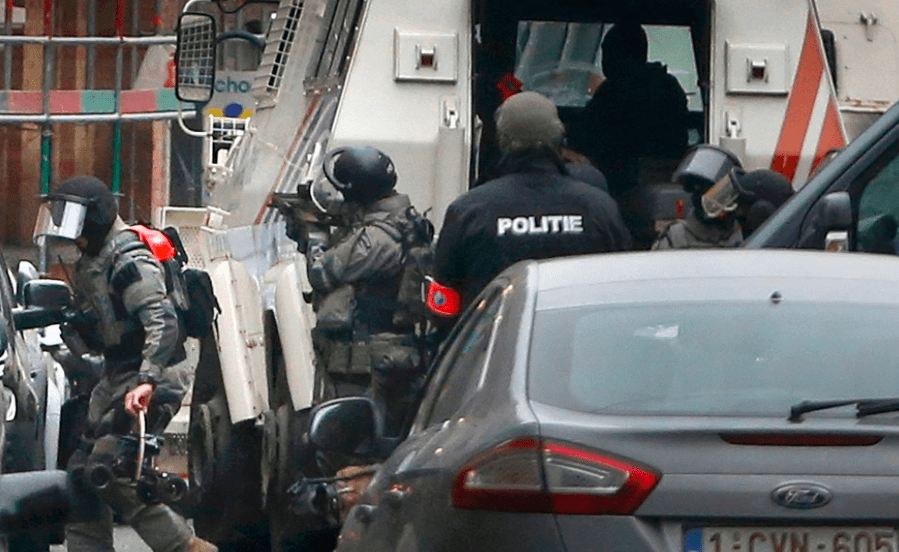The prime suspect for the Paris terrorist attacks has just been captured in a police raid in (you guessed it) Brussels. Salah Abdeslam has been shot in the leg by police commandos, we’re told, and has been taken for questioning. Where did they find him? In Molenbeek, the district that has quickly become known as the terrorist hub of Europe. “We got him,” the Belgian Justice minister has declared. But what he should worry about is how Belgium came to get so many Islamic hardliners in the first place.
For months, now, Molenbeek has been under intense scrutiny. Investigators believe that at least two of the terrorists who carried out the Bataclan attacks had been living there. It’s a heavily Muslim suburb — an area over which Belgian authorities admit they long ago lost control. It undoubtedly shares characteristics with many other poor European suburbs: ugly social housing and high levels of unemployment. But that could be said of many cities. What makes them no-go areas notable is the size and density of their Muslim populations.
It is a problem which no country in Europe experiences so catastrophically as France. In 2011 a report commissioned by the Institut Montaigne, and directed by the noted Islamic scholar Gilles Kepel, found that Seine-Saint-Denis and a clutch of other suburbs of Paris were becoming ‘separate Islamic societies’, holding themselves out as separate from the French state and instituting the rule of Sharia over that of French law. It found that French Muslims were increasingly aligning themselves with Islamist values rather than those of the French state. It is no coincidence that France has the largest percentage of Muslims in its population (around 10 per cent) of anywhere in western Europe. Wherever the concentration gets above a certain level (perhaps 20 per cent), consequences follow. French social planning put all their Muslim immigrants in one place (and usually a place of mass unemployment). And unsurprisingly, it is in the areas with the greatest density of Muslim population that the greatest problems emerge. By 2012, the problem of semi-autonomy had got so bad that the French government was forced to unveil plans to reassert the state’s control over 15 areas, including parts of Lyon, Montpellier, Nice, Strasbourg, Amiens and Aubervilliers, where the population is more than 70 per cent Muslim and the police rarely went. Two years later, a leaked French intelligence document warned that Sharia law was being implemented in schools in Muslim ghettoes. The report gave 70 examples of Muslims turning secular French schools into places of religious indoctrination governed by Islamic law. The question now for France is whether Hollande’s efforts to reimpose French law are any more successful than the efforts of Sarkozy, and whether they are a spasm or a mission. You could argue that Hollande now at least has events behind him. But in the past there have been quite a number of occasions, although not as bloody as this one, when individual cases have broken the surface and temporarily shocked France from its sleep-walk into dissolution and civil war: the stoning to death of a young Muslim woman in Marseilles in 2004; the torture and murder of a young Jewish man by a Muslim gang in the Parisian suburb of Bagneux in 2006; the murders of pupils at a Jewish school in Toulouse in 2012. Each time the Republic rallies, but the country’s pulling apart continues. It is easy for outsiders to point to holes in France’s post-war immigration strategy or the failure of its model of integration. And it is true that France has done immigration and integration badly. But who has not? Yes, travelling on public transport in France you notice lines and routes on which everyone is black and others where nobody is. But there are similar phenomena now across Scandinavia, central and southern Europe. Nor can we be complacent in Britain. It was appropriate for the Prime Minister to leap to Birmingham’s defence when Fox broadcast their piece in January. But Birmingham is in fact a striking example of our own problem. The city remains one of the biggest producers of domestic terrorists and Isis fighters in Britain. Perhaps most striking is the fact that nine tenths of Birmingham’s convicted terrorists come from areas where the Muslim population is between 25 and 50 per cent (the latter figure being more than ten times the national average). Likewise, before anyone notices the centrality of ‘Sharia 4 Belgium’ to the continent’s jihad, it is worth noting that the group’s launch was enabled by Muslim extremists from Britain. Nor is it at all certain that Britain will continue to avoid another mass casualty attack. The Prime Minister recently said the security services had thwarted seven major attacks in the UK in the past six months alone. Of course, it is important to remember how many Muslims in France and Britain came here precisely to avoid the fundamentalists in their faith. And there were problems long before the current migration wave. But as countries like Germany and Sweden decide to take in an additional 1 per cent of their population each year from majority Muslim countries, it is not scaremongering but a simple statement of fact to say that the Muslim population in Europe will increase. And at some point other European countries will go on to experience the kind of problems France has. Perhaps this will bring a popular backlash similar to that now under way in France. But in some ways that would be the lesser of two evils. For if the trend of the no-gozone is not at some point halted or reversed, we must realise that for France, and perhaps for Europe, this will not be decline. This will be fall.






Comments